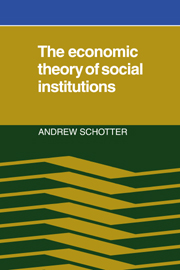Book contents
Summary
Ideas, once conceived, often undergo long gestation periods and are brought forth with great pain. When in the process they grow into monographs or books, one must realize that despite their mature appearance they are still only infants. This book presents a theory of social institutions that is still in its infancy and in no way purports to be fully mature. However, it does, I think, capture the essence of the phenomenon under investigation and present a formal way of dealing with it.
In judging the pages that follow, we must first ask what it is that a theoretical social scientist can attempt when he tries to make sense out of a particular aspect of the real world. It is my feeling that the first step he must take is to strip the phenomenon under study of its misleading worldly trappings and to lay bare its true nature. What may often be discovered is that the exotic phenomenon under investigation is isomorphic to a phenomenon with which we are quite familiar and comfortable. It is in the identification of these structural similarities that the essential qualities of the phenomenon are discovered and it is this process that any social scientific theory must attempt before going on to deal with more complicated questions. This is exactly what I have attempted to do in this book. I have tried to lay bare the essence of social institutions and the structure of the evolutionary problems they are called upon to solve.
- Type
- Chapter
- Information
- The Economic Theory of Social Institutions , pp. xi - xivPublisher: Cambridge University PressPrint publication year: 1981



